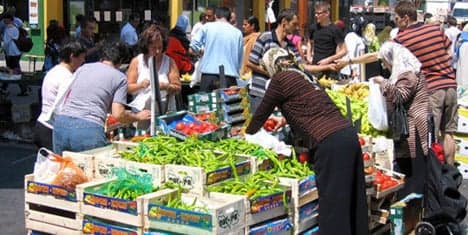Fifty years of guest workers in Austria

How the second and third generation of Austria's Turkish migrants are caught between two worlds.
When Austria welcomed its first Turkish guest workers in 1964 there was little reaction from locals.
Austria was not in fact the first choice of many so-called Gastarbeiters, many of whom would have preferred to go to Germany or Switzerland, where wage levels were higher.
Sylvia Hahn, Vice-Rector of the University of Salzburg, told delegates at a symposium on fifty years of labour recruitment in Vienna on Monday that "concerted attempts at integration only began in the 1980s."
According to the 1964 agreement, an Austrian commission laid down rules for recruitment of Turkish workers by Austrian companies. "The conditions were not particularly attractive," said Hahn.
Wages offered in Austria at the time were commensurate with those in Mediterranean countries, said Cengiz Günay, from the Austrian Institute for International Politics. A previous attempt at recruiting workers from Spain in 1962 had failed.
Hahn outlines four phases in the history of Turkish guest workers in Austria.
Initially they were brought for short term assignments, with jobs in the major industries being reserved for domestic workers. Turkish workers were employed in the textile, ski and paper industries, while many Turkish women found work in the booming tourism business.
The 1980s oil crisis was a turning point. Immigration restrictions were introduced and many migrant workers lost their jobs, prompting wide scale relocation within Austria. Around this time, a family reunification program began, along with the creation of a rudimentary migrant infrastructure.
The collapse of communist Eastern Europe ushered in a new era, creating what Hahn describes as a "two-tier labour market".
Unemployment among youth and older workers began to rise. Smaller businesses in various provinces began to use Turkish workers and some Turks began to work independently. While "marriage migration" increased numbers, many Turkish pensioners began to return to the "old country".
Toward the end of the '90s and early 2000s, xenophobia and Islamophobia began to increase. At the same time, second and third generation Turkish migrants began to participate more in society, although many now remain in rural enclaves.
Hahn echoes Foreign Minister Sebastian Kurz's appeal "to give the Turks in the country more attention". She describes their family life as a "coming and going".
"Many Turkish children grow up between two worlds. For example, some live with grandparents in Turkey. This is a disadvantage for some, but advantageous for others."
According to Günay, 76 percent of Turks in Austria watch Turkish TV, while only a few watch Austrian television. Apart from the language barrier, this has something to do with feeling a sense of exclusion.
On June 19th, Turkish Prime Minister, Recep Tayyip Erdoğan will hold one of his often controversial speeches at Vienna's Albert-Schultz Ice Rink.
Comments
See Also
When Austria welcomed its first Turkish guest workers in 1964 there was little reaction from locals.
Austria was not in fact the first choice of many so-called Gastarbeiters, many of whom would have preferred to go to Germany or Switzerland, where wage levels were higher.
Sylvia Hahn, Vice-Rector of the University of Salzburg, told delegates at a symposium on fifty years of labour recruitment in Vienna on Monday that "concerted attempts at integration only began in the 1980s."
According to the 1964 agreement, an Austrian commission laid down rules for recruitment of Turkish workers by Austrian companies. "The conditions were not particularly attractive," said Hahn.
Wages offered in Austria at the time were commensurate with those in Mediterranean countries, said Cengiz Günay, from the Austrian Institute for International Politics. A previous attempt at recruiting workers from Spain in 1962 had failed.
Hahn outlines four phases in the history of Turkish guest workers in Austria.
Initially they were brought for short term assignments, with jobs in the major industries being reserved for domestic workers. Turkish workers were employed in the textile, ski and paper industries, while many Turkish women found work in the booming tourism business.
The 1980s oil crisis was a turning point. Immigration restrictions were introduced and many migrant workers lost their jobs, prompting wide scale relocation within Austria. Around this time, a family reunification program began, along with the creation of a rudimentary migrant infrastructure.
The collapse of communist Eastern Europe ushered in a new era, creating what Hahn describes as a "two-tier labour market".
Unemployment among youth and older workers began to rise. Smaller businesses in various provinces began to use Turkish workers and some Turks began to work independently. While "marriage migration" increased numbers, many Turkish pensioners began to return to the "old country".
Toward the end of the '90s and early 2000s, xenophobia and Islamophobia began to increase. At the same time, second and third generation Turkish migrants began to participate more in society, although many now remain in rural enclaves.
Hahn echoes Foreign Minister Sebastian Kurz's appeal "to give the Turks in the country more attention". She describes their family life as a "coming and going".
"Many Turkish children grow up between two worlds. For example, some live with grandparents in Turkey. This is a disadvantage for some, but advantageous for others."
According to Günay, 76 percent of Turks in Austria watch Turkish TV, while only a few watch Austrian television. Apart from the language barrier, this has something to do with feeling a sense of exclusion.
On June 19th, Turkish Prime Minister, Recep Tayyip Erdoğan will hold one of his often controversial speeches at Vienna's Albert-Schultz Ice Rink.
Join the conversation in our comments section below. Share your own views and experience and if you have a question or suggestion for our journalists then email us at [email protected].
Please keep comments civil, constructive and on topic – and make sure to read our terms of use before getting involved.
Please log in here to leave a comment.